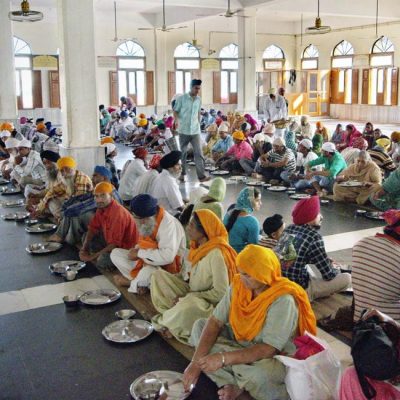SIKHISM
A way of life and philosophy well ahead of its time when it was founded over 500 years ago, the Sikh religion today has a following of over 20 million people worldwide. Sikhism preaches a message of devotion and remembrance of God at all times, truthful living, equality of mankind, and social justice. It denounces superstitions and blind rituals and is open to all through the teachings of its 10 Gurus enshrined in the Sikh Holy Book and Living Guru, Sri Guru Granth Sahib.
The word ‘Sikh’ in the Punjabi language means ‘disciple’, Sikhs are the disciples of God who follow the writings and teachings of the Ten Sikh Gurus. The wisdom of these teachings in Sri Guru Granth Sahib are practical and universal in their appeal to all mankind.
“I observe neither Hindu fasting nor the ritual of the Muslim Ramadan month; Him I serve who at the last shall save. The Lord of universe of the Hindus, Gosain and Allah to me are one; From Hindus and Muslims have I broken free. I perform neither Kaaba pilgrimage nor at bathing spots worship; One sole Lord I serve, and no other. I perform neither the Hindu worship nor the Muslim prayer; To the Sole Formless Lord in my heart I bow. We neither are Hindus nor Muslims; Our body and life belong to the One Supreme Being who alone is both Ram and Allah for us.” (Guru Arjan Dev, Guru Granth Sahib, Raga Bhairon pg. 1136)
“Any human being who faithfully believes in: (i) One Immortal Being, (ii) Ten Gurus, from Guru Nanak Dev to Guru Gobind Singh, (iii) The Guru Granth Sahib, (iv) The utterances and teachings of the ten Gurus and, (v) the baptism bequeathed by the tenth Guru, and who does not owe allegiance to any other religion is a Sikh.” (Reht Maryada, Sikh Code of Conduct
FUNDAMENTAL BELIEFS
- There is only One God. He is the same God for all people of all religions.
- The soul goes through cycles of births and deaths before it reaches the human form. The goal of our life is to lead an exemplary existence so that one may merge with God. Sikhs should remember God at all times and practice living a virtuous and truthful life while maintaining a balance between their spiritual obligations and temporal obligations.
- The true path to achieving salvation and merging with God does not require renunciation of the world or celibacy, but living the life of a householder, earning a honest living and avoiding worldly temptations and sins.
- Sikhism condemns blind rituals such as fasting, visiting places of pilgrimage, superstitions, worship of the dead, idol worship etc.
- Sikhism preaches that people of different races, religions, or sex are all equal in the eyes of God. It teaches the full equality of men and women. Women can participate in any religious function or perform any Sikh ceremony or lead the congregation in prayer
THE RELATIONSHIP WITH GOD
Sikh spirituality is centred round this need to understand and experience God, and eventually become one with God.
To do this a person must switch the focus of their attention from themselves to God. They get this state, which is called mukti(liberation), through the grace of God. That means it’s something God does to human beings, and not something that human beings can earn. However, God shows people through holy books, and by the examples of saints, the best ways to get close to him.
“Truth is the highest of all virtues, but higher still is truthful living.”
Sikhs believe that God can’t be understood properly by human beings, but he can be experienced through love, worship, and contemplation. They look for God both inside themselves and in the world around them to help themselves achieve liberation and union with God.
When a Sikh wants to see God, they look both at the created world and into their own heart and soul. Their aim is to see the divine order that God has given to everything and through it to understand the nature of God. Most human beings can’t see the true reality of God because they are blinded by their own self-centred pride (haumain) and concern for physical things; however, Sikhs believe that God is inside every person, no matter how wicked they appear, and thus, everyone is capable of change.
“Just as fragrance is in the flower, and reflection is in the mirror, in just the same way, God is within you.”
GOD BEYOND OURSELVES
Sikhs believe that God’s message can be found in several ways outside ourselves.
- The message is written in the whole of creation; look at it with open eyes and see the truth of God, for creation is the visible message of God
- Sikhs believe that most of us misunderstand the universe. We think that it exists on its own, when it really exists because God wills it to exist, and is a portrait of God’s own nature
- The message has been shown to us by the Gurus in their lives and in their words
- The message is set down in the teachings of scripture
THE THREE PILLARS OF SIKHISM
Sikhs focus their lives around their relationship with God, and being a part of the Sikh community. The Sikh ideal combines action and belief. To live a good life a person should do good deeds as well as meditating on God. Sikhism doesn’t ask people to turn away from ordinary life to get closer to God. In fact, it demands that they use ordinary life as a way to get closer to God; thus, the three duties that a Sikh must carry out can be summed up in three words: Pray, Work, Give.

naam japna
The Gurus led the Sikhs directly to practice Simran and Naam Japna – meditation on God through reciting, chanting, singing and constant remembrance followed by deep study & comprehension of God’s Name and virtues (Gurbani: the compendium of eternal truth). The inner voice of the Sikh thus stays immersed in praises and appreciation of the Creator and the one eternal God, Waheguru, and his will. The Sikh is to intuitively practice and stay focussed on the True Path through every breath throughout his life

KIRAT KARNI
The Gurus expected the Sikhs to live as honorable householders and practice Kirat Karni—to honestly earn by ones physical and mental effort while accepting both pains and pleasures as God's gifts and blessings. One is to stay truthful at all times, fear none but the Eternal Super Soul, and live a life founded on decency immersed in Dharam—life controlled by spiritual, moral and social values

VAND CHAKNA
The Sikhs were asked to share their wealth within the community by practicing Vand Chakna—“Share and Consume together”. The community or Sadh Sangat is an important part of Sikhism. One must be part of a community that is pursing flawless objective values set out by the Sikh Gurus and every Sikh has to contribute in whatever way possible to the common community pool. This spirit of Sharing and Giving is an important message from Guru Nanak.

